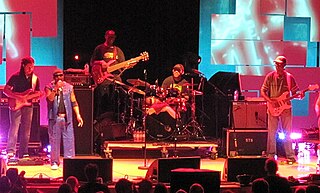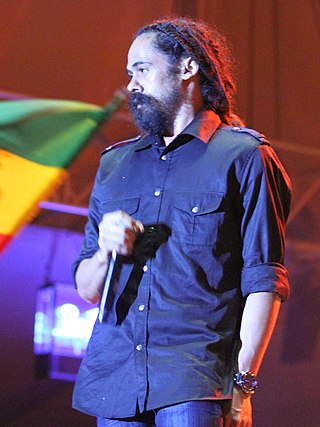Related Research Articles

Reggae is a music genre that originated in Jamaica in the late 1960s. The term also denotes the modern popular music of Jamaica and its diaspora. A 1968 single by Toots and the Maytals, "Do the Reggay", was the first popular song to use the word reggae, effectively naming the genre and introducing it to a global audience. While sometimes used in a broad sense to refer to most types of popular Jamaican dance music, the term reggae more properly denotes a particular music style that was strongly influenced by traditional mento as well as by American jazz and rhythm and blues, and evolved out of the earlier genres ska and rocksteady. Reggae usually relates news, social gossip, and political commentary. It is instantly recognizable from the counterpoint between the bass and drum downbeat and the offbeat rhythm section. The immediate origins of reggae were in ska and rocksteady; from the latter, reggae took over the use of the bass as a percussion instrument.

Ska is a music genre that originated in Jamaica in the late 1950s and was the precursor to rocksteady and reggae. It combined elements of Caribbean mento and calypso with American jazz and rhythm and blues. Ska is characterized by a walking bass line accented with rhythms on the off beat. It was developed in Jamaica in the 1960s when Stranger Cole, Prince Buster, Clement "Coxsone" Dodd, and Duke Reid formed sound systems to play American rhythm and blues and then began recording their own songs. In the early 1960s, ska was the dominant music genre of Jamaica and was popular with British mods and with many skinheads.
The music of Jamaica includes Jamaican folk music and many popular genres, such as mento, ska, rocksteady, reggae, dub music, dancehall, reggae fusion and related styles.
Dub is an electronic musical style that grew out of reggae in the late 1960s and early 1970s. It is commonly considered a subgenre of reggae, though it has developed to extend beyond that style. Generally, dub consists of remixes of existing recordings created by significantly manipulating the original, usually through the removal of vocal parts, emphasis of the rhythm section, the application of studio effects such as echo and reverb, and the occasional dubbing of vocal or instrumental snippets from the original version or other works.
Rocksteady is a music genre that originated in Jamaica around 1966. A successor of ska and a precursor to reggae, rocksteady was the dominant style of music in Jamaica for nearly two years, performed by many of the artists who helped establish reggae, including harmony groups such as the Techniques, the Paragons, the Heptones and the Gaylads; soulful singers such as Alton Ellis, Delroy Wilson, Bob Andy, Ken Boothe and Phyllis Dillon; musicians such as Jackie Mittoo, Lynn Taitt and Tommy McCook. The term rocksteady comes from a popular (slower) dance style mentioned in the Alton Ellis song "Rocksteady", that matched the new sound. Some rocksteady songs became hits outside Jamaica, as with ska, helping to secure the international base reggae music has today.

The Maytals, known from 1972 to 2020 as Toots and the Maytals, are a Jamaican musical group, one of the best known ska and rocksteady vocal groups. The Maytals were formed in the early 1960s and were key figures in popularizing reggae music.

Desmond Dekker was a Jamaican ska, rocksteady and reggae singer-songwriter and musician. Together with his backing group the Aces, he had one of the earliest international reggae hits with "Israelites" (1968). Other hits include "007 " (1967), "It Mek" (1969) and "You Can Get It If You Really Want" (1970).

Third World is a Jamaican reggae fusion band formed in 1973. Their sound is influenced by soul, funk and disco. Although it has undergone several line-up changes, Stephen "Cat" Coore and Richard Daley have been constant members.

Bob Marley and the Wailers were a Jamaican ska, rocksteady and reggae band. The founding members, in 1963, were Bob Marley, Peter Tosh, and Bunny Wailer.
There are several subgenres of reggae music including various predecessors to the form.

Damian Robert Nesta "Jr. Gong" Marley is a Jamaican DJ, singer, lyricist and rapper. He is the recipient of four Grammy Awards.
Joseph Benjamin Higgs was a reggae musician from Jamaica. In the late 1950s and 1960s he was part of the duo Higgs and Wilson together with Roy Wilson. He was a popular artist in Jamaica for four decades and is also known for his work tutoring younger musicians including Bob Marley and the Wailers and Jimmy Cliff.

Frederick Nathaniel "Toots" Hibbert, was a Jamaican singer and songwriter who was the lead vocalist for the reggae and ska band Toots and the Maytals. A reggae pioneer, he performed for six decades and helped establish some of the fundamentals of reggae music. Hibbert's 1968 song "Do the Reggay" is widely credited as the genesis of the genre name reggae. His band's album True Love won a Grammy Award in 2005.
People from the Caribbean have made significant contributions to British Black music for many generations.

Julian Ricardo Marley is a British-Jamaican reggae musician, songwriter, producer and humanitarian. He is the son of reggae music icon Bob Marley, and Lucy Pounder. In 2024, he received a Grammy Award for Best Reggae Album for his collaboration album with Antaeus, Colors of Royal (2023).
Japanese ska is ska music made in Japan. It is, along with its counterparts elsewhere in the world, part of what has been called the "third wave of ska [that] combines the traditional Jamaican Club sound with metal, punk, folk, funk, and/or country."
Reggae fusion is a fusion genre of reggae that mixes reggae and/or dancehall with other genres, such as pop, rock, hip-hop/rap, R&B, jazz, funk, soul, disco, electronic, and Latin music, amongst others.
The Skatalites are a ska band from Jamaica. They played initially between 1963 and 1965, and recorded many of their best known songs in the period, including "Guns of Navarone." They also played on records by Prince Buster and backed many other Jamaican artists who recorded during that period, including Bob Marley & The Wailers, on their first single "Simmer Down." They reformed in 1983 and have played together ever since.
Filipino reggae or Pinoy reggae is reggae music created in the Philippines. The country has several bands and sound systems that play reggae and dancehall music in a style faithful to its expression in Jamaica. Reggae in the Philippines comprises the many forms of reggae and its subgenres, and at times combining traditional Filipino forms of music and instruments in their music.

Natty Nation is an American rock and reggae band from Madison, Wisconsin. Founded in 1995, as of April 20, 2017, the lineup included Demetrius "Jah Boogie" Wainwright, Aaron Konkol AKA Eyes of Moses, Anthony Paul Willis (drums), & Nick Czarnecki (guitar). The group has released several studio albums since their 1996 debut The Journey Has Just Begun..., in 2010 Isthmus (newspaper) named their 1998 release Earth Citizen one of the "top 25 Madison pop albums of all time," writing that "Natty Nation's mix of roots reggae and hard rock proved unique and gained a following that remains today," and their 2016 release, Divine Spark debuted at #3 on the Billboard (magazine) Reggae Chart.
References
- ↑ "ペッカー - ペッカー・パワー+インスタント・ラスタ (2in1CD) - @TOWER.JP". Archived from the original on 2005-10-24. Retrieved 2008-11-20.
- ↑ "Top 100 Japanese pops Artists - No.91".
- ↑ "Top 100 Japanese pops Artists - No.75".
- ↑ "Top 100 Japanese pops Artists - No.71".